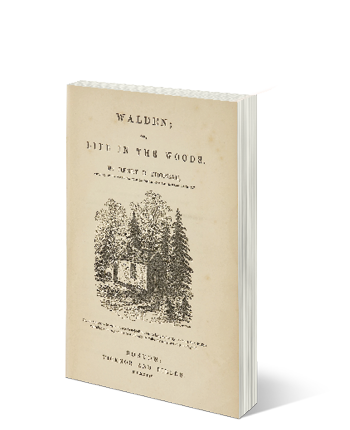Henry David Thoreau hasn’t aged well, particularly since his death 159 years ago. Through modern eyes, the 19th century author looks like an out-of-touch dreamer, a privileged loafer. The guy who avoided a real career to live in a cabin in the woods now has his words relegated to hiking guides and inspirational notecards.
A counterpoint, if I may. Thoreau couldn’t be more relevant to this moment, to us. While his words lean idealistic, his professional life was far more pragmatic. Read in context—knowing what preceded his escape to the cabin and what followed it—Walden becomes a guide to professional reinvention. Considered a formative piece in the canon of American literature, the book has at times been described as a personal declaration of independence and a manual for self-reliance.
Consider this. Thoreau graduated from college as the country reeled economically from the Panic of 1837. Jobs were sparse; businesses were failing. New technologies changed how people lived, worked, and shared information. And around the world, people were catching a mysterious lung disease without a cure. Thoreau caught it, too.
It wasn’t an ideal time to ponder professional fulfillment, but economic uncertainty and a pandemic can compel one to rethink life choices.
While his Harvard classmates flocked to secure careers in finance and law, Thoreau explored his options. He became a teacher, but his stand against corporal punishment forced his resignation. The job in his father’s pencil factory? Meh. He worked as an editorial assistant, a job that brought him joy but no pay; he shoveled manure, a job that brought him pay but no joy. He struggled to be a freelance writer through all of it, as tricky an endeavor then as now.
By the time Thoreau went to the woods, he faced a question as devastating as it is ordinary: How can I make a good living while living a good life?
* * *
Walden is the book people love to hate. I get it. Here’s a single white guy without kids offering advice on how to live life well. Still, each time I read it, I cheer for him. Because of his tuberculosis, Thoreau knew his life wouldn’t be long, but insisted it would be interesting. His family was poor, and at Harvard, he fell behind in classwork each time he took breaks to earn tuition money. After he earned a prestigious degree with countless ways to monetize it, he remained insistent: He wanted to be a writer in a world that didn’t like to pay writers. Perhaps my sympathy is a side effect of my profession.
Walden isn’t an easy read. I get that, too. It’s only the weight of my book that prevents me from chucking it across the room during those meandering middle chapters. He ponders ants as they wrestle; he contemplates, at length, the depth of the pond. He’s got a lot to say about beans.

Henry David Thoreau’s Walden is a controversial classic of early American literature.
But this isn’t a book about shunning money or success. Thoreau spent his two years by the pond grappling with the purpose of the first and the meaning of the second. It’s a book about creating a personal business plan. Thoreau titled his first chapter—his longest and most quoted—“Economy.” He wrote that he went to Walden Pond “to transact some private business” and to “acquire strict business habits.”
I’ve distilled his insight into a model I call Waldenomics. Waldenomics presents Thoreau’s five principles of business—the business of making a living—inspired by his time at the pond and developed during the years following it.
Waldenomics Principle 1: Redefine capital. You spend more than money; you spend your life.
“[T]he cost of a thing is the amount of what I will call life which is required to be exchanged for it, immediately or in the long run.” —Walden
If we think of currency as our energy and time—not just money—our measure of success changes. Know the literal price of things, Thoreau advised, but know their costs, too. It changes the math on big decisions, as a lucrative job can come with more price than profit if it robs one of all energy. A less-expensive house in the suburbs that brings a stressful commute has a price tag in hours as well as dollars.
Thoreau created a personal economic model that puts money in its periphery but maintains profit as its goal. If we trade in life, how’s our ROI?
Thoreau wasn’t a guy who disregarded money, however. Like many people who didn’t have much money as a child, he obsessed over it as an adult. In Walden, he listed his budgets down to the half-penny (seriously). These budgets revealed a shift: They began with his expenses, not salary. Lower expenses granted him greater professional freedom, “for a man is rich in proportion to the number of things which he can afford to let alone.”
Everything comes with a price, even—and perhaps especially—a career. Thoreau’s goal was to find a job that paid him more than it cost him.
Waldenomics Principle 2: Your passion doesn’t need to be your paycheck, but don’t let your paycheck destroy your passion.
“I have found out a way to live without what is commonly called employment… Indeed my steadiest employment, if such it can be called, is to keep myself at the top of my condition…” —Thoreau’s response to an 1847 Harvard alumni survey
Thoreau was no purist. The guy we know as America’s naturalist earned most of his money through surveying land for developers preparing to build roads and neighborhoods through forests.
During his thirties, after he left Walden Pond, Thoreau needed money. Lots. He owed a publisher $290—equivalent to a year’s salary—after his first book flopped. When his father’s pencil plant suffered a fire, he needed about $500 to recover. Thoreau did what many of us do. He sold out. But instead of hitting up a Harvard finance buddy for a job in New York, he found a well-paying job that kept him where he was happiest: in muddy boots in the woods with a notebook. Surveying, oddly, became the most Thoreau way to sell out.
Thoreau continued to fill journals with observations and essays about nature. One day, about two years after becoming a professional civil engineer, Thoreau took a walk around Walden Pond. He rested on an oak stump and realized he was at the site of his old cabin. There, he felt inspired to return to a project he put away years before. A book. The book.
Thoreau found a job that allowed him to stay “at the top of his condition,” where he was happy and where he could think big thoughts. He sold out, just enough, to buy his way back in.
Waldenomics Principle 3: Be willing to quit a good job. Beware a “dangerous prosperity” that distracts you from bigger goals.
“I left the woods for as good a reason as I went there. Perhaps it seemed to me that I had several more lives to live, and could not spare any more time for that one.” — Walden
We wouldn’t know Thoreau as a writer if his contemporaries hadn’t known him as a quitter. One woman, upon hearing about his Walden experiment, called him “a good-for-nothing, selfish, crab-like sort of chap, who tries to shirk the duties” of adulthood. Yet Thoreau didn’t job hop for lack of success. When he taught, he became one of the highest-paid and most beloved teachers in town. While at his father’s factory, he invented a graphite mill that revolutionized the industry and created the country’s finest pencil. He lived with his mentor Ralph Waldo Emerson as the tutor and caretaker of his children—an easy life in a beautiful home, but one he called “a dangerous prosperity” that distracted him from a greater calling.
Quitting a job to begin again can require greater perseverance than remaining loyal to the wrong one. Thoreau disregarded the accolades and criticism of others to work toward a higher, harder goal: earning his own respect.
Waldenomics Principle 4: Use technology selectively.
“We do not ride on the railroad; it rides upon us.” — Walden
“We do not use social media; it uses us.” — Thoreau today, probably
Thoreau has the reputation of a curmudgeon who hated technology. Not true. He had the mind of an engineer (remember his graphite mill?) and marveled at inventions. He didn’t want to just ride a train; he wanted to know how a steam engine worked. He despised, however, how mindlessly people adopted innovations as tools of distraction—how such smart things could come to such dumb ends.
In the mid-19th century, printing presses produced newspapers and magazines more cheaply than ever, and a glut of content followed. In Walden, Thoreau chided people who read the news multiple times a day yet barely noticed what was in front of them. When the trans-Atlantic telegraph was in development, he believed people thought more about using it than having anything meaningful to convey when they did.
Thank God he never saw Twitter.
Thoreau believed our lives are “frittered away by detail,” and those details distract us from the focus needed to think original thoughts, not merely react to reactions. The telegraph—or social media or television or video games—isn’t evil on its own, but prioritizing technology over ideas makes people “the tools of their tools.”
Waldenomics Principle 5: Feeling lost is a “memorable crisis.” Embrace it.
“Not till we are lost, in other words, not till we have lost the world, do we begin to find ourselves, and realize where we are…” — Walden
Thoreau loved liminal spaces. He found beauty where disparate things overlapped: one season against another, nature against civilization. He didn’t build his cabin in the wilderness; he built it two miles from town by the railroad. He sought solitude, but kept his door unlocked for friends who visited daily.
He thrived in the liminal spaces of life, too, when one chapter ended and the next hadn’t quite begun. These are the times we become most attuned to our true selves. Thoreau cringed at the “young men who had ceased to be young, and had concluded that it was safest to follow the beaten track of the professions.” His favorite people were like him, who didn’t suffer from uncertainty but found motivation in it, who thrived in liminal spaces.
The guy who shoveled poop for a paycheck recognized that not every day was a dream day at work. The guy who surveyed his beloved woods knew that money meant compromise. Yet Thoreau refused to associate adulthood with unquestioned allegiance to professional misery. He strived to remain a little lost, a little separate, and encouraged readers to do the same.
And then maybe, on an ordinary day—perhaps while resting on an oak stump—we’ll have space enough to notice the hint of a beginning, the start of a new liminal state, and realize we have another life to live, and can’t spare any more time for this one.
This article originally appeared in the March/April 2021 issue of SUCCESS magazine.
Photo by wavebreakmedia/Shutterstock







